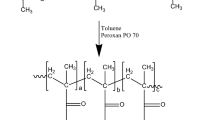We have studied the effect of the biodegradable polymer TPA (Thermal Polyaspartate Anion) on the acidity of diesel fuel and its blends with biodiesel. We determine the effectiveness of the polymer based on the acid number of the polymer/fuel composition. The results show that the acid number is significantly reduced when the polymer is added, i.e., the quality of the fuel is improved.

Similar content being viewed by others
References
C. G. Tsanaktsidis, “Optimizing the physical–chemical properties of Diesel fuel by introducing bio-organic compounds,” Chemistry and Technology of Fuels and Oils, 47, No. 3, 209-212 (2011).
Changes in Diesel Fuel. The Service Technician’s Guide to Compression Ignition Fuel Quality, National Biodiesel Board, Jefferson City USA (2007).
C. G. Tsanaktsidis, S. G. Christidis, and G. T. Tzilantonis, “Study about effect of processed biodiesel in physicochemical properties of mixtures with diesel fuel in order to increase their antifouling action,” International Journal of Environmental Science and Development, 1, No. 2, 205-207 (2010).
C. G. Tsanaktsidis, S. G. Christidis, and G. T. Tzilantonis, “Use of bioorganic compounds for reducing the moisture content of diesel fuel to reduce the icing effect,” Chemistry and Technology of Fuels and Oils, 46, No. 3, 211-212 (2010).
J. Van Gerpen, B. Shanks, R. Pruszko, D. Clements and G. Knothe, “Biodiesel production technology,” Subcontractor report prepared for the U.S. Department of Energy, Office of Energy Efficiency and Renewable Energy by Midwest Research Institute, National Renewable Energy Laboratory NREL/SR-510-36244, Battelle July 2004.
ASTM D1298 – 99 (2005), Standard Test Method for Density, Relative Density (Specific Gravity), or API Gravity of Crude Petroleum and Liquid Petroleum Products by Hydrometer Method.
ASTM D445 - 06, Standard Test Method for Kinematic Viscosity of Transparent and Opaque Liquids (and Calculation of Dynamic Viscosity).
ASTM D1744-92, Standard Test Method for Determination of Water in Liquid Petroleum Products by Karl Fischer Reagent (withdrawn 2000).
ASTM D4809 - 09a, Standard Test Method for Heat of Combustion of Liquid Hydrocarbon Fuels by Bomb Calorimeter (Precision Method).
ASTM D664, Standard Test Method for Acid Number of Petroleum Products by Potentiometric Titration.
Gerhard Knothe, “Analyzing biodiesel: Standards and other methods. A review,” JAOCS, 83, No. 10, 823-833 (2006).
Bruno O. Dalla Costa, María Laura Pisarello, and Carlos A. Querini, “Biodiesel production from high acidity raw materials,” in: 2nd Mercosur Congress on Chemical Engineering, 4th Mercosur Congress on Process Systems Engineering, Rio de Janeiro, 14-18 August 2005.
L. E. Nita, A. P. Chiriac, C. M. Popescu, I. Neamtu, and G. Alecu, “Possibilities for poly(aspartic acid) preparation as biodegradable compound,” Journal of Optoelectronics and Advanced Materials (JOAM), 8, No. 2, 663-666 (2006).
ASTM D2276 - 06, Standard Test Method for Particulate Contaminant In Aviation Fuel by Line Sampling (2006).
Author information
Authors and Affiliations
Additional information
Translated from Khimiya i Tekhnologiya Topliv i Masel, No. 1, pp. 31 – 34, January – February, 2012.
Rights and permissions
About this article
Cite this article
Tsanaktsidis, C.G. Using a biodegradable polymer to reduce the acidity of biodiesel and biodiesel/petroleum diesel fuel blends. Chem Technol Fuels Oils 48, 44–48 (2012). https://doi.org/10.1007/s10553-012-0335-2
Published:
Issue Date:
DOI: https://doi.org/10.1007/s10553-012-0335-2




